Do you spend a significant amount on ads and paid search (or PPC), yet at times fail to get the expected results? I will tell you why. In today’s digital world, every penny counts, and PPC is one of the most efficient tools to connect with intent-driven customers. But this can not be done by simply running ads. Instead, you need the ‘paid search intelligence’ for it. This intelligence is about deeply analyzing keywords, competitor behavior, advertisement copy performance, and expenditure efficiency. And all this will convert your ad dollars into profit.
SE vs SEO vs SEI vs PPC

First, let me clear the difference between search engine, search engine optimization, search engine intelligence, and paid search engine intelligence (or PPC), as many get confused between these four, especially between optimization and intelligence.
| Term | What It Is | Purpose | Example |
| Search Engine | A platform that indexes and delivers web content. | Helps users find information online. | Google, Bing, DuckDuckGo |
| SEO (Search Engine Optimization) | Strategies to improve organic rankings on search engines. | Increase visibility and traffic without paying for ads. | Optimizing keywords, backlinks, and site speed |
| Search Engine Intelligence | Insights driven by data from search engines (keywords, competitor performance, user intent). | Paid and organic campaigns are optimized using data | Analyzing competitor keywords, trends, and ad performance |
| PPC (Paid Search) Intelligence | Analysis specifically of paid campaigns (bids, ad copy, CTR, CPC, ROI). | Maximize return on ad spend by improving paid campaign performance. | Monitoring competitor Google Ads campaigns, bid strategy, and ad creatives |
Also Read: LLMO SEO Guide: Make Content Discoverable by AI
What is Paid Search Intelligence?
Paid search intelligence is about making ads, not just by chance, but by using data and insights to make online ads perform efficiently and effectively. Instead of recklessly running ads, businesses study the following information:
- Most searched keywords by people
- Studying competitor advertisements
- Cost of different clicks
- Which ads have the highest conversion rates
Pondering upon these points helps in wiser budget allocation and better results.
How Paid Search Intelligence Works?

1. Data Collection
Get a clear picture of the market and audience behavior by gathering keyword, ad, and competitor insights.
2. Study Patterns
By picking out the best-performing keywords and ads, you can spot trends that help you drive results and cut budget waste.
3. Map & Align Strategy
To ensure your money is spent on the most fruitful options, update bid, targeting, and ad copy accordingly to the findings.
4. Test & Improve
Small experiments can help refine performance. Run A/B testing, where A is your current option (in your control, such as free shipping) and B is a slightly different option (your test, like 30% off). By testing these options, you can figure out which is getting you higher click-through or conversion rates.
5. Measure Results
Regular tracking of ROIs, clicks, and conversions will help you make necessary changes and retain result-driving methods.
Real-Time Use Cases of Paid Search Intelligence
1. Tracking & Bidding with Server-Side Data
A German company, Aqua Blue, was experiencing data gaps due to ad blockers and poor browser tracking. They used server-side tracking (SEI application) to fix these gaps and achieved 29% cost reduction per conversion overall, and there was also an impressive 36% drop in CPC.
2. Competitor & Brand Protection Insights
UK-based software provider company, Sage, partnered with Adthena to deal with rising costs on branded keywords. Adthena’s brand protection and competitor monitoring tools served a jawdopping 75% drop in CPC for their brand term and 33% decline in partner impression share. It was done with better oversight and keyword adjustments.
3. AI-bidding & Competitor Keyword Intelligence
Brand X is a US pet-pharma company that got improved search results by restructuring their competitor keyword campaigns, using constant targets and allowing AI to help in bidding. They observed a 48% increase in clicks, 60% increased new customers and customer acquisition cost reduction by 38%. All this was done without spending extra on ads.
4. Predictive Insights by Machine Learning Optimization
The Luxury Closet, a retailer from Dubai, leveraged machine learning to optimize bidding and creative across networks by adopting Google Smart Shopping campaigns over traditional shopping campaigns. It helped them with a 50% cost cut per conversion and even boosted their average conversion rate by 45%.
Also Read: Top Data Science Projects for Your Portfolio From Beginner To Advanced
5. Keyword Intelligence
A printing company named ExpressColour used keyword intelligence to remove bad keywords. They refined their search campaigns by removing inefficient keywords like ‘cheap’ and ‘cheapest’, which were bringing traffic but not the right kind, leading to fewer conversions.
Best Paid Search Intelligence Software
Let me list some best paid search intelligence tools showcasing their strengths and pricing.
1. Adthena

Best deals in comprehensive competitive study and brand protection in paid search.
Key Features
- Adthena gives a whole market view technology for complete and challenging landscape insights.
- Its AI-driven tools, like ‘Ask Arlo,’ provide actionable search intelligence.
- It can guard your brand presence with its brand activator and takedown features.
Pricing: Custom pricing as per your needs.
2. PPC.io

It is best known for analyzing competitors with advanced AI tech and is also best for campaign optimization.
Key Features
- Automation in competitor audits and generating campaign blueprints.
- It also reviews intelligence and has landing page optimization tools.
- Stay ahead with its AI-driven insights to outperform rivals.
Pricing: Free, $99/month (Pro). You can join their waiting list.
3. Semrush

Semrush is one of the best paid search intelligence tools that comes with its all-in-one digital marketing suite and strong paid search capabilities.
Key Features
- Advertising toolkit for research and optimization of paid ad campaigns.
- Tools for competitor analysis and keyword research.
- Well integrated with SEO and content marketing tools for a complete strategy.
Pricing: Free, $139.95/month (Pro), $249.95/month (Guru), $499.95/month (Business)
4. Hubspot

It’s the best option for all-inclusive inbound marketing & sales automation, CRM integration with paid search intelligence.
Key Features
- Features AI-powered tools optimizing campaigns and nurturing leads.
- It is in line with Google Ads for smooth ad management.
- Offers sophisticated assessment & reporting supporting campaign performance tracking.
Pricing: Free with basic features, $15/month for starting deals. Visit the official page for more pricing details.
5. Google Keyword Planner

Google Keyword Planner is best used for keyword research and planning Google Ads Campaigns.
Key Features
- New keywords and historical statistics.
- Budget and bid planner for Google Ads Campaigns.
- Keyword performance and competition estimation.
Pricing: Free use with a Google Ads account, no extra cost beyond Google Ads expense.
Future of Paid Search Intelligence: Predictive Insights
Paid search intelligence is not just limited to keywords and tracking rivals; it’s slowly stepping towards predictive analytics with the help of AI. Meaning modern platforms don’t only show you what’s happening, they can even anticipate what’s next. AI-driven search ad expenditure is projected to reach $26 billion by 2029.
- AI Forecasting: Search intelligence leverages historical data to predict keywords, spot trends, and CPC changes before they occur.
- Automated Ad Optimization: Machine learning can help adjust bids, keep timings in check, and target in real-time to cut wasted spend.
- Voice & Visual Search Signals: Increasing voice assistance and image-based search intelligence platforms now have new metrics to perform by tracking these non-traditional searches.
- Target Marketing: There can be ad personalization by predictive insights that help brands deliver a spot-on ad message to a user searching for the same topic, at the right moment.
Conclusion
Now you are well aware what search intelligence is and what the paid search intelligence platforms are; therefore, you can understand that paid search intelligence is not just a sidekick in business but an inevitable step towards a planned and cost-efficient method of making the best use of paid ads and marketing. I always say that in today’s time, content and data are king makers, be it any domain. And this is what paid search intelligence companies prove by using data-backed ad strategies. The paid search experts turn raw data into executable information to make better decisions while reducing cost, making marketing smarter, faster, and more fruitful.
Also Read: AI in Jobs & Workplace – The Workplace Automation





